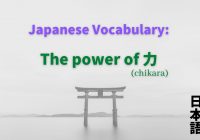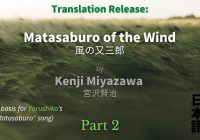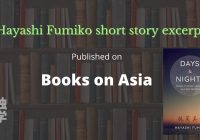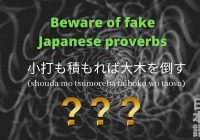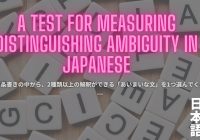Japanese vocabulary: the power of 力 (“chikara”)
In this article I’d like to go over the Japanese kanji 力 (which can be read “chikara”, “ryoku”, or “riki”), including some compounds that are made with it. This kanji has a bunch of meanings, but the majority of them can be categorized as “power”, “force”, or “energy”. But before we get too far I… Read More »
Japanese E-book release: “Classic Japanese Fairy Tales [Volume 5]” by Mimei Ogawa
My series of Japanese fairy tales, “Classic Japanese Fairy Tales”, is one of my favorite projects because each of Mimei Ogawa’s stories manages to pack a significant message in a small, easy-to-understand form. This makes everything from story selection, translation, and editing a real joy, and these attributes also make these stories useful for those… Read More »
Japanese literature translation: 風の又三郎 (Matasaburo of the Wind) by 宮沢賢治 (Kenji Miyazawa) [Part 2]
Excerpt of a Hayashi Fumiko story published on Books on Asia
Documentary Series Review: “Prime Japan”
Beware of fake Japanese proverbs
When learning a foreign language, it’s generally a good idea to learn some proverbs, what we call “kotowaza” (諺) in Japanese. It’s not just because they are a fun way to learn new words in context, but also because proverbs can express meaningful ideas in a concise form that often reflects that country’s history and… Read More »
Japanese literature paperback release: “Days & Nights: Stories of classic Japanese women’s literature” by Hayashi Fumiko
A test for measuring distinguishing ambiguity in Japanese
My friend and collaborator Kaimai Mizuhiro (開米瑞浩) is working on an project that I think will be interesting to those studying Japanese, so I’ll talk about it a little here. Kaimai has a bunch of books out, and a common thread throughout them is how to communicate effectively (both verbally and with diagrams) in a… Read More »

